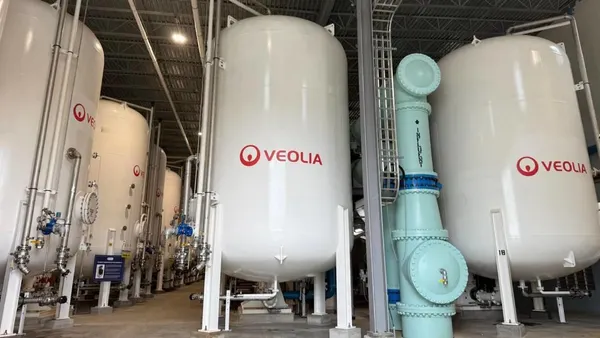UPDATE: June 18, 2019: The Philadelphia City Council voted to approve disposal contracts with Waste Management and Covanta for up to a seven-year term at its June 13 meeting. The council also voted to approve a new recyclables processing contract with Waste Management for a five-year term.
Dive Brief:
- The Philadelphia City Council's Committee on Streets and Services recently approved plans to award new disposal contracts to incumbents Waste Management and Covanta for up to a seven-year term. Other bidders included Republic Services and National Environmental Group.
- Under the proposed deal, Waste Management would receive an estimated 67% of Philadelphia's residential and small business waste and Covanta would receive the remaining 33%. The contracts are worth $26 million and $13 million respectively for the first year starting on July 1, or an estimated $295 million combined over the full seven-year term.
- An estimated 70-80% of waste managed by the Philadelphia Streets Department has historically gone to various WTE destinations, and the agency doesn't anticipate a notable change. Dozens of local organizations, including the Energy Justice Network, have expressed opposition to any contracts that include WTE.
Dive Insight:
While Philadelphia's upcoming recycling contract — also approved by the committee — may have received more attention (given that some city material was burned amid a service disruption), the disposal deals are of a greater scale. The Streets Department collected an estimated 580,000 tons of waste during FY18, with volumes projected to rise — and it will remain reliant on such deals until any of the city's waste reduction efforts potentially come to fruition.
Waste Management plans to utilize two local transfer stations to move material to its Fairless Landfill and the Wheelabrator Falls incinerator, both in Morrisville, Pennsylvania. Some material will also stay in Philadelphia at the company's SpecFuel facility (which creates a form of RDF for cement kilns) or Forge Core Organics Recycling facilities. Tip fees for all disposal locations are set at $65.25 per ton for the first year, though the company may charge up to 40% more for organics. The Streets Department noted the inclusion of this option to "pilot the extraction of organics for beneficial use" as a departure from prior contracts, but no set timeline or volumes have been announced yet.
Covanta's plan also includes multiple transfer stations as well as two company-operated incinerators in Chester and Conshohocken, Pennsylvania. Tip fees vary more depending on the destination of material, ranging from $57 to $65.50 per ton for the first year. The Streets Department pointed to Covanta's inclusion of a $0.25 per ton carve-out (for waste delivered to select locations) to be spent on "zero waste and litter initiatives" — along with an e-waste program — as new features of this contract.
Multiple issues were raised by advocacy groups around the volume of waste committed to these contracts and the potential health effects of incineration. While the groups note they would prefer more waste reduction, recycling or organics processing, they maintain that even landfills are preferable to any form of WTE technology. Each contract requires the city to deliver at least 75% of maximum daily quantities to the respective companies for the initial four-year term — a stipulation seen as running counter to waste reduction goals.
Philadelphia's "zero waste" framework counts the creation of an "engineered fuel product" as a form of waste diversion, but aims to move away from current disposal methods. In the long term, the city aims to "fully eliminate the use of landfills and conventional incinerators by 2035," increase waste diversion to 90% and allow the remainder to go to a non-conventional WTE process. At present, it appears Philadelphia will remain among the ranks of large Northeast cities such as Boston (and increasingly New York) that view conventional incinerators as the most viable disposal option for the foreseeable future.










